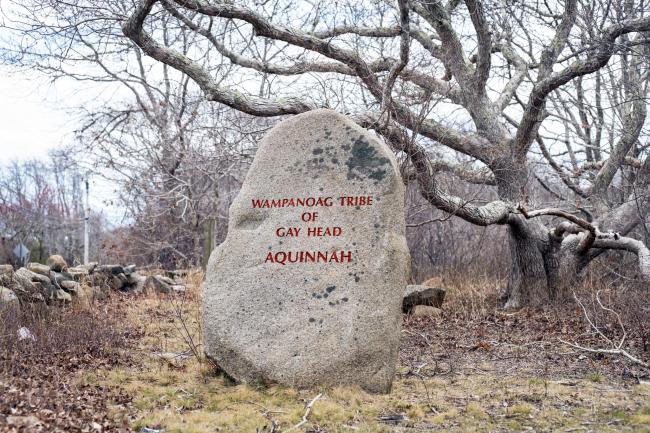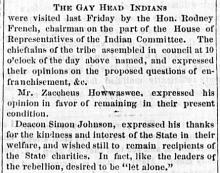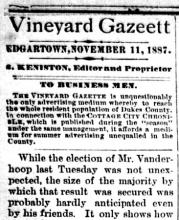As Gay Head entered the 1900s, it was one of the newest towns in the commonwealth. The English settlers at first considered it part of Chilmark, then decreed it an Indian district from 1855 to 1870, and finally granted it legal independence as the town of Gay Head in 1870. In creating the town, the legislature permitted tribal members of the place they called Aquinnah to divide their land severally and establish a town meeting form of government. To start its life as an incorporated town in the commonwealth of Massachusetts, the state gave Gay Head a treasury of $2.68.
At the turn of the century the men of the Wampanoag tribe were already citizens, allowed to vote and run the town, which they did rather well for more than 100 years. Not only did they serve as selectmen, but also in every other town office. Most of the decisions affecting the town were made simply, by consensus, until the early 1970s.
Capt. Walter W. Manning and Leonard F. Vanderhoop Sr. each served as selectman of our town for more than 50 years. Maysel Vanderhoop served as the tax collector for 42 years, a position now held by Mrs. Audrey Jeffers-Mayhew. Aquinnah is surely the only town in the commonwealth to still have a cranberry agent, a position held by David E. Vanderhoop and once, for decades, by his great-uncle David. Today the selectmen are Walter Delaney, Michael Hebert and Carl Manning Widdiss
In 1900 there were 43 households in town. Tourism was a major source of income, as it is today. Gay Head men served at the United States Life-Saving Service, which in 1915 became part of the Coast Guard with a station established atop the Cliffs. Charles W. Vanderhoop Sr. was the only Wampanoag to serve as lighthouse keeper; other Gay Headers served as assistant keepers.
Gay Head remains a Native American community with descendants living and working on their ancestral lands and retaining family homes that have survived for nearly a century. Gay Headers worked mostly as farmers and fishermen; others served at the Coast Guard or Life-Saving station, the lighthouse or the post office.
A few non-Indians began purchasing land at the turn of the century. But with Gay Head so remote, the main reason to buy was farming, and because so many people thought the soil was poor, few invested in Gay Head property. But things have changed since then. Land that once sold for $5 an acre is selling for more than $100,000 an acre in 1999.
During World War I, Gay Head sent a higher share of men to fight than any other town in New England; twenty-three men served, one-third of the “voting strength” of the town, and all but one an Indian. For this record of service Gov. Samuel W. McCall honored the town with a plaque that sits in front of the town hall today.
The town hall was planned and built in the 1920s. It not only housed the town offices but also served as a community center. This is a town whose citizens always rallied to assist one another in time of need or to complete a project.
There was the Aquinnah Club which was formed in the early 1940s by Mrs. Ruth (Richardson) Jeffers. The women met frequently and planned square dances, plays, or penny sales for their fund-raising efforts as well as for pure enjoyment and entertainment. It was not only a chance to get together socially but also educationally, for it was at these gatherings that the women of the town learned how to cane chair seats, braid rugs or make lampshades.
During the 1940s women were finally allowed to go scalloping on Menemsha Pond with their husbands. The selectmen had issued a permit to one woman in town as her husband was unable to go. A group of women, led by Mrs. Jacqueline D. Manning, asked for the same opportunity. The selectmen took their request under advisement at the meeting that evening, and the next morning scallop permits were issued. In 1999 women still go scalloping with their families.
Scalloping helped support most through the winter months. Due to predators, the scalloping has been less productive in recent years but in 1998 there was once again a considerable harvest.
In February 1951 Gay Head was finally wired for electricity, the last community in the commonwealth to receive it. A celebration was held at the town hall to commemorate the electrification of the town. Nearly everyone participated in a play to inaugurate this amazing event.
Following the advent of electricity the Fresnel lens, a wonder of more than 1,000 prisms which had come to the lighthouse a century before from France, was no longer needed. The lens was moved to the Martha’s Vineyard Historical Society in Edgartown, where it remains, much to the dismay of the community.
Today, the town must keep pace with the age of modern technology. Nearly everyone has a computer or laptop at home, and fax machines are a necessity. Instead of sharing telephone numbers, townspeople now share e-mail addresses. Photocopiers, scanning equipment, portable telephones, and cellular telephones are now part of everyday lives.
At the first town meeting after the town officially changed its name to Aquinnah last summer, a cellular telephone rang. Everyone turned around to see who was receiving a telephone call. It turned out to be none other than our most revered tribal chief Donald F. Malonson. So yes, even the most traditional among us have kept up with the age of technology.
But even the most modern technology cannot help retrieve what was lost in 1955, when a fire broke out at the home of town clerk Freda Madison. All of the vital records were kept at her home at the time and were lost in the fire; nearly a century’s worth of documents was totally destroyed.
At one time, town activities were centered around the Old South Road area. In the mid-1800s the Community Baptist Church and the school were moved closer to the newly built State Road where they remain today. The Community Baptist Church has remained a mainstay within the community. Services at one time were held twice on Sunday and once during the week. Traditionally the church was used as a meetinghouse where hymns were sung following prayer. Nearly the whole community attended baptisms, weddings and funerals. That’s another custom carried on today. Church suppers and quilting bees were held as fund raisers to augment the salary of the ministers.
In the 1960s the lighthouse keeper’s house was torn down after the lighthouse was automated. Keeper Joseph Hindley and his family were the last residents. They were then transferred to Nobska Light at Woods Hole.
Sadly, too, at the end of the school year in 1966 the one room schoolhouse closed due to decreased enrollment. Children were taught there from grades one through six. They were then bused to the Tisbury school for their remaining school years. Families occasionally boarded down-Island or even moved off-Island to educate their children.
Most of the teachers at the Gay Head school were members of the community. Mrs. Evelyn (Moss) Vanderhoop taught at the school in the mid-1920s and her daughter Mrs. Helen (Vanderhoop) Manning was the last to teach there, from 1957 through 1966. For more than a century Gay Head children were taught at the little red schoolhouse — a school where those of us even today can remember kerosene lamps, outdoor plumbing, a wood burning stove, and walking to school. Today the little red schoolhouse is the Aquinnah Public Library, the oldest municipal building still in use in town.
Children are now bused to the West Tisbury school for grades one through eight. Through the efforts of their teacher Joel Weintraub, the eighth-grade students have enjoyed a class trip to England for each of the past 14 years. The trip has nearly a 98 per cent participation rate.
Occasionally a few children have been enrolled in the Menemsha school in Chilmark for their grammar school studies, where Mrs. Beatrice (Vanderhoop) Gentry once taught, following years of teaching on Indian reservations. A sign of changing times: For nearly two decades non-tribal children have outnumbered the tribal children in school enrollment from the town.
High school students have traveled to the Martha’s Vineyard Regional High School for the past 40 years, an hour-long bus ride each way. The curriculum at the regional high school has grown over the years and rather than just the basic classes, students now participate in computer studies and horticultural classes; culinary arts, once a typical home economics class for girls, is now for both boys and girls.
The high school students have also had an opportunity to travel to Europe for their language classes and with the Minnesingers under the direction of Robert Nute. Gay Head students have traveled to not only England but to France, Germany, and Spain. They have known only two principals at the high school, Charles Davis and Dr. Gregory Scotten.
In the early 1970s the selectmen of Wampanoag descent faced quite a dilemma when the tribe filed an action to recover more than 200 acres of Common Lands from the town. It placed the selectmen in a precarious position, because what became a long struggle pitted family against family. In the end the tribe was able to regain its Common Lands.
In fact, over the centuries there had always been a division within the community. At first this was mostly a physical one, a division of those living on the east side of town from those living on the west. The division remains apparent today, yet more in a political sense than a physical one. In 1976, for example, the town saw a total change in the leadership within the tribe. The previous regime did not easily accept the change and continuously challenged the new tribal leadership, creating a perpetual political conflict which spilled over at a town meeting. My, how history has a way of repeating itself.
During the summer of 1966 the Gay Head Cliffs were declared a national landmark by the United States government. A dedication ceremony was held, attended by Sen. Edward Brooke, Rep. Benjamin Mayhew, Secretary of the Interior Stuart Udall, Gov. John Volpe, and other statesmen.
The late 1960s saw the demolition of the Stony Squaw Inn, which once had been a popular hotel owned and maintained in Aquinnah Circle for more than a century by the Vanderhoop family. In its final years a museum was housed at the inn during the summer months to display artifacts on loan from various families. Today there are two inns remaining in the town. The Outermost Inn is owned by the Taylor family and sits near the Cliffs. The Duck Inn, once the Belain homestead, overlooks the south side. Artifacts are presently on loan at the tribal building and await the building of the planned Aquinnah Cultural Center.
The year-round population has remained close to 200 over the past century. Residents who once spent their winters in Tisbury, New Bedford, Boston, Providence and Washington, D.C. now do so in the same towns, but also in California, Hawaii, Nevada and Utah.
The tourist season that once ended with Labor Day now extends into November. Between May and October thousands of tourists visit the Cliffs every day, arriving by bicycles, mopeds, motorcycles, private vehicles, shuttle buses, taxis and tour buses. During the summer of 1999 the Vineyard Transit Authority is providing hourly bus service to this remote end of the Vineyard in an effort to alleviate some of the traffic congestion experienced during the season.
Residents have shared the natural beauty of our town with renowned people for more than half a century. Author Max Eastman built in East Pasture more than half a century ago, as did Margaret Webster. Artist Thomas Hart Benton lived exactly on the border of Gay Head and Chilmark but always swam on the Gay Head side. Actor Paul Benedict has been enjoying his offstage time in our midst. Mrs. Jacqueline (Bouvier) Kennedy Onassis bought a significant amount of the southeast part of town; her daughter Caroline Kennedy Schlossberg keeps the estate here. Michael J. Fox and his family have spent part of each summer at the family homes of his wife Tracy and enjoy our town so much they named one of their twins Aquinnah.
President Clinton, First Lady Hillary Rodham Clinton and their daughter Chelsea have visited Aquinnah a few times this past decade, having dinner at the Outermost Inn and luncheon with the Kennedys.
Today residents are blessed to have a myriad of services available to them. The Up-Island Council on Aging, under the direction of Mrs. Joyce Bowker, keeps daily watch over the elders and provides a warm and safe haven for them to congregate for social activities during the weekday year-round.
The town is grateful to have a fully trained Aquinnah Fire Department under the direction of fire chief Walter E. Delaney, and also to receive services from the Tri-Town Ambulance. It has always had a Wampanoag police chief. Today he is Douglas Fortes. The late chief, Kenneth F. Belain, served his community in a simple and diplomatic manner for 22 years. His son Randhi Belain is now a corporal in the police department. Sgt. Michael Marshall has been with the town for more than two decades. We also have three additional police officers — Sean Slavin all winter long, assisted by two summer officers.
In 1997, by a rather small margin, the town voted to change the name from Gay Head to Aquinnah (the Algonquin word for “Land under the Hill”). In July 1997 June D. Manning gave the historical perspective, and Carl Manning Widdiss the municipal perspective, before the house and senate in the Joint Committee on Local Affairs. Their testimony preceded the votes of three separate legislative committees, and finally a signing of the name change by Gov. Paul Cellucci in May 1998. On the 5th of August 1998 our town was once again called Aquinnah — the newest official name in the commonwealth given to the oldest community in the commonwealth.
It was of historic significance to many within the community, for this town has remained a native community for many centuries.
Actually, not that much has changed over the past century in the town. The citizens have maintained their ancestral homelands, rural character and pace of life. And yes, the political atmosphere remains about the same.




 1 comment
1 comment



Comments (1)
Comments